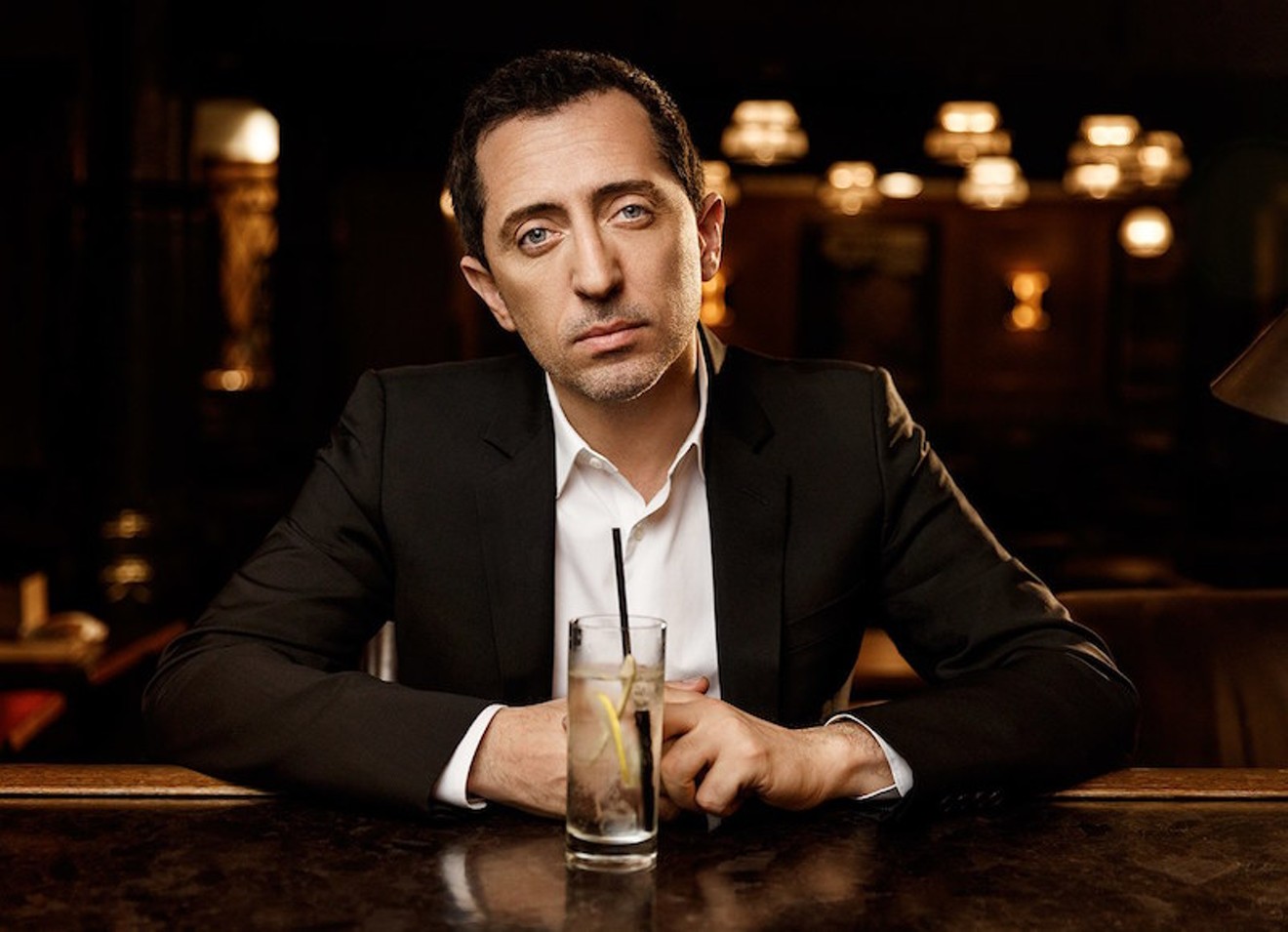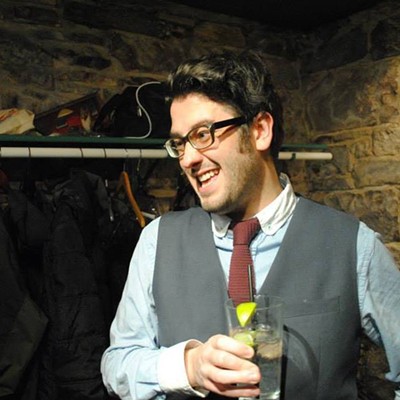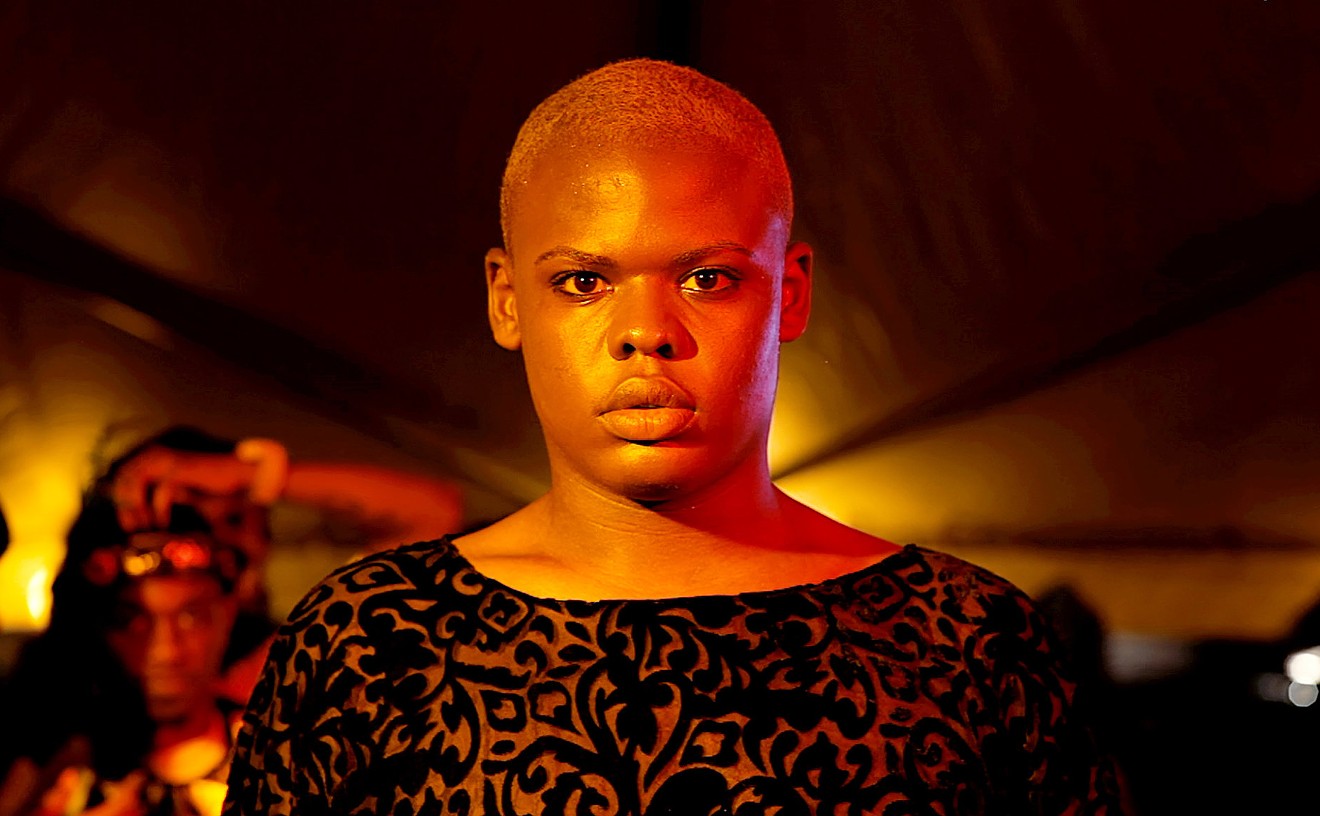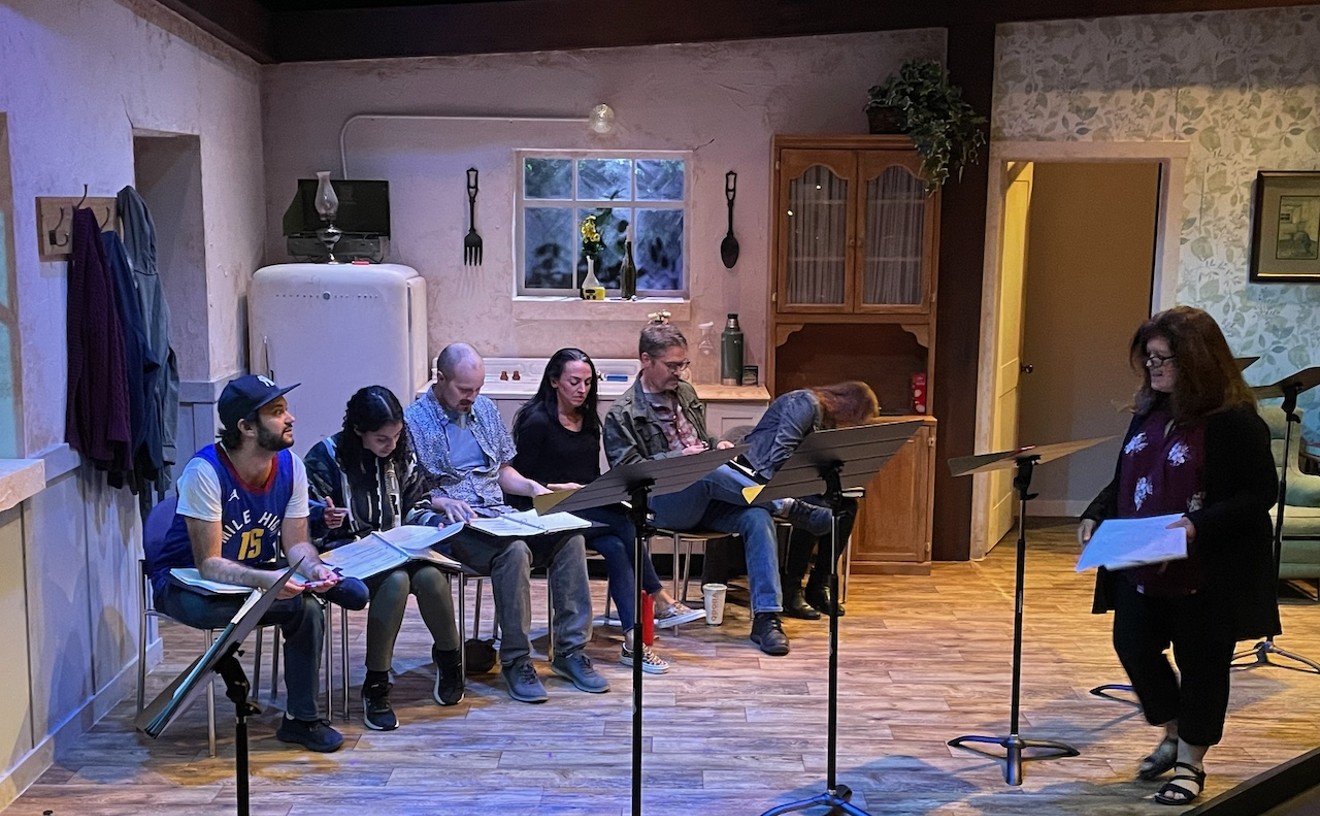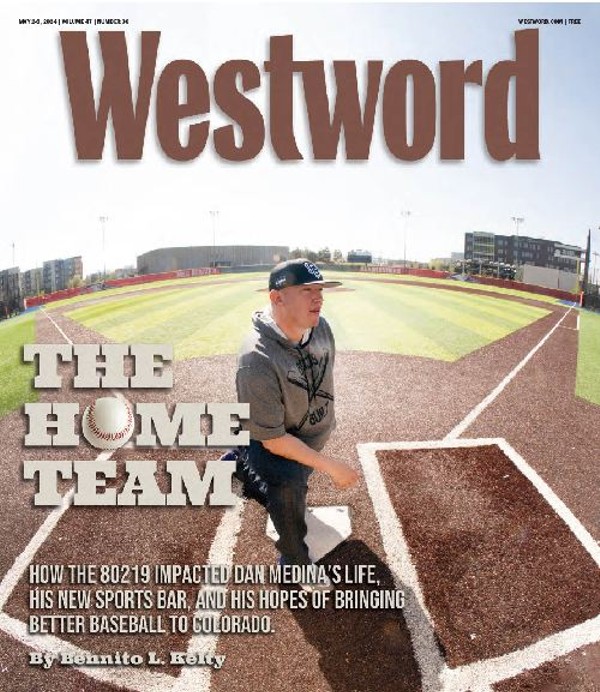One of Europe's most famous working comedians, Gad Elmaleh recently relocated to New York to make his mark on the American entertainment industry, the last frontier of stardom. Born in Morocco, the multilingual Elmaleh has been performing one-man shows in Paris since the ’90s, and he wrote, directed and starred in Coco, a European box-office smash. Stateside, Elmaleh is probably best known as a character actor who stole scenes in films like Midnight in Paris, The Adventures of Tintin: Secret of the Unicorn and Crisis in Six Scenes; since moving here, he's appeared on Conan, The Late Show With Stephen Colbert and Comedians in Cars Getting Coffee.
In anticipation of his Sexpot Comedy-sponsored headlining showcase on Thursday, January 19, at the Gothic Theatre, Westword caught up with Elmaleh to discuss translating his act into English, his friendship with mentor Jerry Seinfeld, and his fascination with the Big Blue Bear, aka Lawrence Argent's "I See What You Mean."
Westword: Thanks again for agreeing to do the interview.
Gad Elmaleh: I'm in a car but I'm able to talk, no problem. It's raining a lot, which is very surprising in Los Angeles. I got here from Paris last night, and it has rained since I got here.
They don't know how to handle it there.
No, not at all. They are lost. It's funny, by the way. It's not what I was expecting, I was so into the cliché of California, and I was expecting the whole cliché with the sun and the palm trees and everything. I was expecting the beach, and nothing. I never talk about the weather; I always think that to talk about the weather is boring. But when it rains in California, eh, that is interesting.
I'm sure that's all anyone else there is talking about, too.
Are you in Texas?
No, I'm in Denver.
No, I know that. But I have never been. It's going to be the first time for me.
It looks like there's a lot of places you've probably never been before on this tour.
Oh, yeah. I hear so many things about Denver, but I've never been. That's the first show, the show in Denver, so I'm excited. I hear so many clichés, I just want to go and check this out.
What are the clichés you hear about Denver?
A lot of different things. The Western thing, like the movies. I hear about the art, I don't know, like there is a lot of art, there is the museum and also, what is "LoDo"?
It's a sort of cultural district. There are historic buildings, shops, restaurants and lots of bars. It's sort of a nightmare around 2 a.m. if you don't like having people puke on your shoes.
It depends on what shoe you're wearing that day. I hear so many things, but from what I read about Denver, it seems like — sorry, my English, I still look for my words — it feels like the city is in good social health. Like the employment, the business and the art, I always hear good things. But what about the Western thing, is it true, the cowboy thing?
Not so much anymore in the city, but there are absolutely parts of the state where people still kind of dress like that.
And what about the bear. There is a bear, no?
You mean wild bears? Again, up in the mountains, but not in the city.
No, the blue—
Oh, yes. There's a big statue of a blue bear downtown. It looks like he's peering into the windows.
There's a girl in New York, she said, "When you go to Denver, go see the blue bear." And I said, "Why? I don't care. Maybe I will go to the museum, but I don't care about this bear." And she said, "No, no, you must see it," and she was laughing so much, and I don't know why. So I must see this blue bear.
A lot of public art in Denver is just giant blue animals. There's also a giant blue horse by the airport. Take a normal thing and make it big — that's Denver art.
That's why when French people gave you the Statue of Liberty, they made it huge. And by the way, we have another Statue of Liberty in Paris; it's the same, but it's very small.
So, you perform a more observational, joke-driven kind of comedy, which didn't really exist in France before you came along. Was it a challenge at first to introduce a new style to audiences?
Yeah, I would say — and obviously I did not invent comedy in France — but it was not the same way of doing standup like Americans. It's very direct and efficient, talking directly to the audience. We have more of a theatrical tradition, with act-outs and more performing. It's funny — One of my good friends is Jerry Seinfeld, and every time he wants to make fun of European comedians, he'll say, "You guys all need props and music and mimes and rabbits." That's exaggerating, obviously, but it comes from something about how French people like a one-man show. They want you performing theatrically, doing characters and playing music. To be honest, why I started: I was inspired a lot by Jerry when I saw his work on stage. Obviously, we got his shows subtitled in French, but that was not really the thing that hit me, you know? The thing that really hit me was his standup. When I discovered that, it blew my mind. I was like, "Wow, I want to do this. This is exactly like what I do here."
I wanted to be as efficient and sharp as he is. I want to talk to the audience. This is what I've been doing in my work in French forever — talking about small things becoming big problems. I notice all the details, all the tiny little things. And not only me, but also two or three other comedians in France: We got inspired by those guys. It's funny — There's another French comedian who has been inspired by Chris Rock a lot, and when you watch him, in French, you can tell. So we were inspired and fascinated with American comedians. And eventually I was saying to myself, maybe it would be better, instead of trying to become an American comedian in France, to mix those two styles and those two genres. Because of course it's good to be efficient and sharp, and to have a joke every twenty seconds, but it can be a little cold and dry. I like when I perform to do voices and use body language, you know? And what's funny, this is what I'm trying to do now in my act now that I've moved here.
In New York?
Yeah, I go back and forth. But now that I'm here, I want to do my shows in English and I want to do standup, but I want to keep these theatrical roots. It's my roots as a North African, a Moroccan and French also. This is a mix, and this mix is really good.
I'd imagine jokes land better when you make people feel like they know you. I'm sure a lot of audiences still think, "Who's this French guy?"
That's funny, because I think that's the whole challenge. Because obviously, language is a challenge. Writing jokes, no matter what language you write them in, is a challenge. But the other challenge that I'm discovering here is that I don't get any credit when they say my name. They butcher it, or invent a new name, but when I go up there, the challenge is that I really feel I need to earn those laughs. In France, I'm not going to say the audience will laugh for nothing, but you could compare the response I get to the response Louis CK or Chris Rock would get if they go up in a club in Denver tonight. Those first ten minutes are free.
Oh, sure, they're greeted with standing ovations before they say a word.
Yeah, you could be barking for ten minutes, you know?
People would say it was genius.
"Genius. It was crazy, you know what this guy did? He barked for ten minutes. Incredible, this guy is so talented." But when you're done with the barking, they will need something. When they don't know you, when you don't have credits and they're thinking, "I don't know this French guy," your first five minutes are trying to seduce them, trying to get them on your side. And it's not easy. That's the opposite. Maybe at the end of your set, you could bark.
You gotta earn that barking.
That could be a good title for a book: Earn That Barking.
When you’re adapting your act for American audiences, can you translate jokes directly from the French, or do you have to essentially start over?
I thought I would just be able to translate, but that was a big mistake. I started to translate, and obviously I focused on different bits that I had been doing that were universal bits with very mainstream, general ideas. Nothing specific to France, obviously; that would never land regardless of the language. So I thought I would only have to translate my good bits, bits that I had been working out in Europe for years. And I was wrong. Because even though they worked, it was never as strong as when I wrote specific material with my perspective on an experience. Talking about being an outsider was working, and that's what comedians need to do. I like being able to go up to a comedian and say, "Only you could have done that bit. Only you can talk about this or that." I can talk about how it feels to be born in Morocco, spend your whole life in France and now try to be doing standup in English. I know how it feels, I know the stories.
Once you've said you are, you can go on to talk about how you manage with girls, with culture and with comedy. The perspective becomes more strong and more interesting the more I talk about it. If an American comedian were to come to France and start doing shows in French — I know this will never happen, but if it did, I would be interested in their stories. I want to hear what he thinks about France, his perspective and observations. That's why I started to write material that is very specific about what I'm experiencing every day, and talking about it on stage. For instance, when I get to Denver, I am going to be seeing things and making observations. Even if it's not worked out a lot, I can say my observations about what I saw today for two or three minutes in the beginning and people will recognize it. I may even talk about the blue bear.
People really do love that bear.
Really? Now I have my first five minutes.
It seems like you made a deliberate choice when you moved to the United States to live in New York and focus on comedy clubs rather than live in L.A. for movies and television. What drew you to that path?
Again, I'm thinking about a conversation I had with Jerry Seinfeld about coming here. I remember talking with him, and he made fun of me for moving to New York. He said this funny thing: "Standup comedy has been invented here. What you're doing now is exactly like if I went to Italy and started a pasta factory, and then I go to France to sell baguettes and then I go to Germany and start making cars. People in New York are used to the best because this is where comedy comes from." But this is why I came to New York. Standup was invented in New York, and that's a great challenge for me. If I want to be pretentious, I could do an analogy with soccer. I'm sorry I don't know baseball, but maybe you can translate for me after. If I play in a club, an okay club, and I'm at the top of the game in a small city, I'm going to say, "Guys, I want to go to PSG or Real de Madrid." I don't know, what's the best baseball team in the U.S.?
Maybe the Yankees? I don't know baseball, either, but I do know analogies. I was following the football analogy just fine.
It's the same for everything. If you want to to do jazz music, you should go to New Orleans. You don't say, "I am going to move my family to Fort Lauderdale, Florida, so I can be a jazz musician." You don't open a museum about the history of literature in Las Vegas. That's funny. My choice was driven by comedy, to perform standup in the clubs. I go to comedy clubs everywhere. I'm performing this weekend in Los Angeles, and I don't how to say this, but the scene is not vibrating. Vibrating? I don't know. When I go to New York, as soon as I land, I jump in a cab and I go to the Comedy Cellar or to Gotham, and I know exactly what I'm going to find. I don't know if the new jokes will work, or if I'm going to do good. Or "kill," as they say. It's funny, they use only war terms in comedy.
Yeah, you're either bombing, killing or dying.
I don't know how to say it in English, but, yeah, New York suits me. I was born in Morocco, I lived in Montreal, I lived most of my life in Paris, and if you ask me what's the place I feel at home, I would say first it is New York, you know? Of course, when I go back to Casablanca, I get very emotional. I love Morocco, and it's my home country, but there's something strange about New York. I feel like I've been living there forever. It's funny — now I am walking down the street in Los Angeles, and even though it is raining, people still want to eat on the terrace.
What do you think it is about about the Comedy Cellar in particular that makes it such a destination for comics to stop by and work on new material?
People talk about the quality of the comedians when they talk about the Cellar, but for me, what I like is the crowd. It's a high-profile crowd. When I say high-profile, I don't mean they are bourgeois or anything, I mean they are comedy fans. When you perform in front of comedy fans, I'm not saying it's easy, but the relationship, the connection, is much stronger. Comedy is kind of a language, so you're connected and relating. It's like sports again: I'm sure athletes also know if the audience is cheering for them, if they are excited and having fun. It's a legendary room. All the big names perform there, all the comedians and everyone in the crowd know that it is not easy to get a spot there. You can't just show up; you have to be really accepted before they give you a spot. And after a couple spots, there is a table at the restaurant above, and every comedian likes to hang out there. I remember being really shy and not daring to go sit with the comedians because I feel like I didn't have the card or the membership. But once you're accepted, you feel at home. Even if I don't perform, I go there to say hi to my friends and hang out. I know them all now. It's also exciting because people know that Jerry or Chris Rock or Aziz Ansari could just pop in, so that makes it fun.
What’s the worst show you’ve had in the States?
The worst shows have always been the shows where people eat a lot during the show. Now I'm getting used to it and I understand, but to be honest with you, I was so distracted in the beginning when I started working in clubs.
You hadn't performed somewhere with waiters walking around?
Oh, yeah. I did a residency at Joe's Pub, which is a great room in New York City, and I stayed there almost seven months for three nights a week. It was a great experience for me, but in the beginning, I didn't know that they don't just serve chips and beer. They have buckets with rosé, chicken paillard and salads! People are having dinner and watching the show. And obviously, it's just mechanical, just logical: They cannot laugh because they have cheeseburger in their mouths. So that was really shocking to me in the beginning, but now I'm used to it. But to be honest with you, if I was in the crowd, I would find it fun; I would love to have dinner while being entertained. But for the performers? Oh, my God. I'd stop and look at people sometimes, because it was really distracting. But now am I used to it. Now if they don't eat, I'm like, "What's happening? Where is the food?"
You’ve had opportunities to work with heroes of yours like Jerry Seinfeld and Woody Allen. Are you used to being around them at this point, or do you still get starstruck sometimes?
Star what? Star?
Like intimidated or flustered? I guess "starstruck" is a kind of strange expression.
I don't know, I just learned it. But no, I travel with Jerry, I go on tour with him. In February, I'm going to be going on tour with him and opening his shows. So no, we work together and we're really close. I did a movie with Woody Allen, and then I was in his series, the one he did on Amazon. It's not the same relationship, obviously. I don't call up Woody Allen and say, "Hey, let's get a beer." We have conversations, but it's very rare. But no, I do not get starstruck. I learn, I learn.
Anything else you want to mention before we wrap up the interview?
Make sure you keep the blue bear so I can see it when I'm in Denver. Don't tear it down, okay?
Gad Elmaleh headlines the show starting at 8 p.m Thursday, January 19, at the Gothic. Get tickets, $30 to $35, at axs.com.
[
{
"name": "Air - MediumRectangle - Inline Content - Mobile Display Size",
"component": "12017618",
"insertPoint": "2",
"requiredCountToDisplay": "2"
},{
"name": "Editor Picks",
"component": "17242653",
"insertPoint": "4",
"requiredCountToDisplay": "1"
},{
"name": "Inline Links",
"component": "18838239",
"insertPoint": "8th",
"startingPoint": 8,
"requiredCountToDisplay": "7",
"maxInsertions": 25
},{
"name": "Air - MediumRectangle - Combo - Inline Content",
"component": "17261320",
"insertPoint": "8th",
"startingPoint": 8,
"requiredCountToDisplay": "7",
"maxInsertions": 25
},{
"name": "Inline Links",
"component": "18838239",
"insertPoint": "8th",
"startingPoint": 12,
"requiredCountToDisplay": "11",
"maxInsertions": 25
},{
"name": "Air - Leaderboard Tower - Combo - Inline Content",
"component": "17261321",
"insertPoint": "8th",
"startingPoint": 12,
"requiredCountToDisplay": "11",
"maxInsertions": 25
}
]

